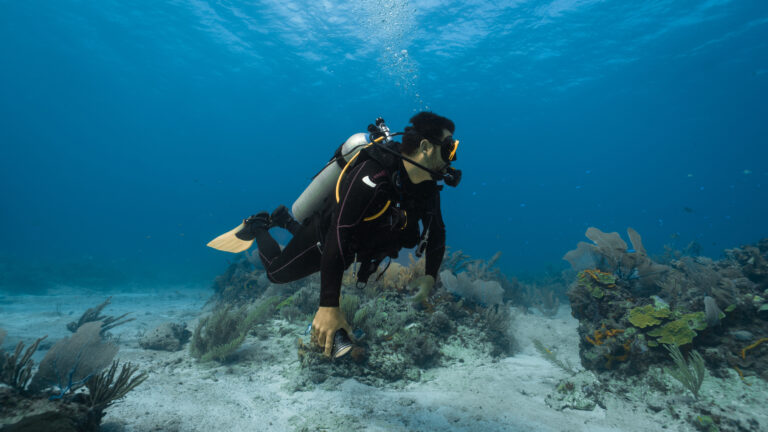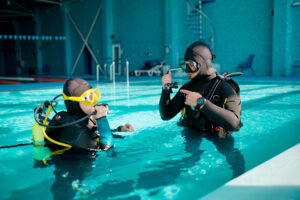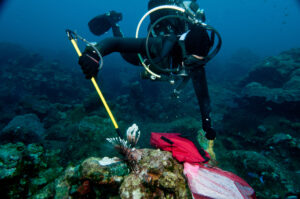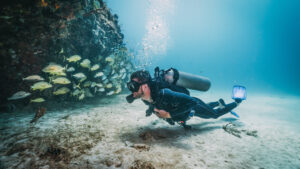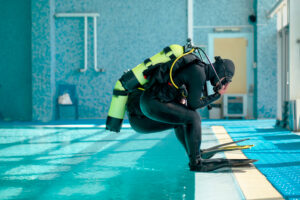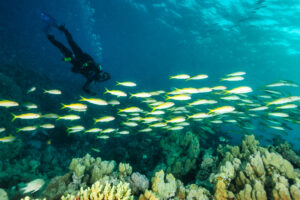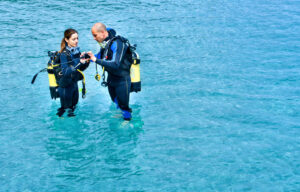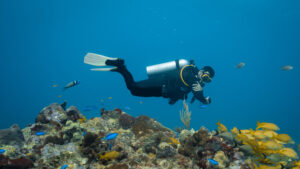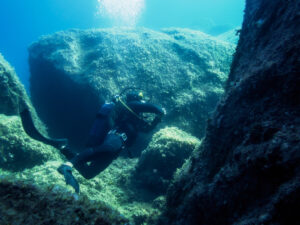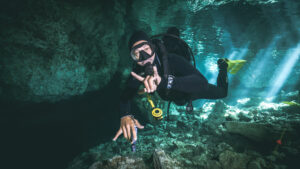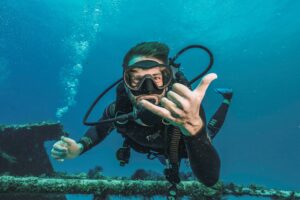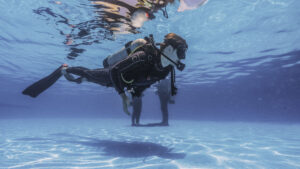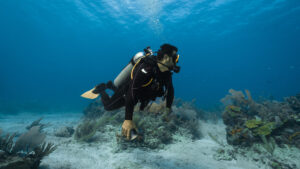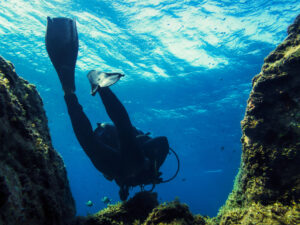What is Solo Diving?
Solo Diving, often characterized by the absence of a traditional “dive buddy,” is a practice in the scuba diving community that, while controversial, has gained recognition and acceptance over time. This unique form of underwater exploration, requiring heightened vigilance and self-reliance, deviates from conventional scuba guidelines that universally prescribe the buddy system for safety.
Historical Context
Historically, the notion of solo diving has been discouraged within the scuba diving community due to the inherent risks associated with venturing underwater alone. Traditional scuba training programs advocate the buddy system, a practice that partners two divers together for mutual assistance and safety in the event of an emergency. However, the advent of modern technology, advanced training methods, and changes in diving demographics have led to a gradual shift in perspective towards solo diving.
Safety Concerns and Controversy
Solo diving presents unique challenges and risks, making it a contentious topic among diving enthusiasts. Potential hazards range from equipment failure and medical emergencies to navigation difficulties and wildlife encounters. The absence of an immediate assistance source underwater inherently increases these risks. Critics argue that no matter how experienced or well-equipped, a diver should never dive alone due to the unpredictable nature of underwater environments.
Advancements in Equipment and Training
Despite the controversy, advancements in diving technology and education have made solo diving a more viable option for experienced divers. Modern diving gear now includes redundancies, such as dual regulator systems and independent air sources, which minimize the risk of equipment failure. Additionally, dive computers provide real-time data on depth, no-decompression limits, and ascent rates, enabling divers to manage their dive profile more effectively.
Training for solo diving has also become more sophisticated and rigorous. Divers are required to demonstrate mastery in self-rescue skills, emergency management, and decision-making under stress. Many certifying agencies, such as the Scuba Diving International (SDI) and Professional Association of Diving Instructors (PADI), now offer solo diving certification courses, emphasizing that solo diving is not for beginners but for experienced, well-trained divers.
The Solo Diver’s Mindset
A successful solo diver requires not only advanced skills and equipment but also a particular mindset. This mindset is characterized by self-reliance, meticulous planning, and a respect for the potential dangers of the underwater world. Solo divers must anticipate and prepare for all possible contingencies, including equipment failure, entanglement, disorientation, and rapidly changing environmental conditions. As such, solo divers typically carry more equipment and take more time to plan and prepare for their dives.
The Role of Solo Diving in Scientific Research and Underwater Photography
Solo diving also plays a crucial role in certain professional and technical diving pursuits. In scientific research and underwater photography, for instance, divers often need to operate independently to focus on their tasks without worrying about a buddy. However, these divers usually have extensive training and experience, and their activities are often supported by surface teams.
The Ethical Considerations of Solo Diving
The practice of solo diving raises not only safety issues but also ethical considerations. Solo divers, by choosing to forego the buddy system, must understand their responsibility towards themselves and the wider diving community. The potential hazards associated with solo diving could lead to rescue scenarios that risk the safety of other divers or rescue personnel. Moreover, a solo diving incident could negatively impact the reputation of the diving community as a whole, possibly leading to more restrictive regulations. Therefore, the decision to solo dive should not be made lightly, and the ethical implications must be carefully weighed.
Techniques and Strategies for Solo Diving
Successful solo diving demands the development of specific techniques and strategies. Solo divers often employ a more cautious approach to their dives, with slower descent and ascent rates and more conservative no-decompression limits. They also tend to stay closer to their entry and exit points to minimize the risk of navigational errors.
Additionally, solo divers need to become proficient in using and maintaining their equipment, as they must rely on themselves for any necessary in-water adjustments or repairs. They need to master the art of buoyancy control, as a solo diver can’t rely on a buddy for assistance in fine-tuning their position in the water column. Mastery of signaling techniques is also crucial, as a solo diver must be able to communicate effectively with surface support personnel or other divers, if present.
Psychological Aspects of Solo Diving
The psychological aspects of solo diving are often overlooked but are just as critical as the physical and technical aspects. Diving alone can be a serene and meditative experience, but it can also be stressful and potentially frightening, especially in challenging or unfamiliar environments. The solo diver must possess strong mental fortitude, the ability to remain calm under pressure, and the capacity to make clear, rational decisions in the face of potential danger.
The Future of Solo Diving
The future of solo diving is likely to be shaped by further advancements in diving technology and education. As more divers seek the freedom and self-reliance that solo diving offers, we can expect a continued evolution of equipment, training standards, and safety protocols to support this trend. The dive community’s ongoing dialogue about solo diving will undoubtedly continue to challenge and refine our understanding of what it means to dive responsibly and safely.
In conclusion, solo diving represents a distinct segment of scuba diving that caters to a specific type of diver – one who values independence, self-reliance, and the unique experience of exploring the underwater world alone. It is not a practice to be taken lightly, and it demands a high level of expertise, preparation, and respect for the potential dangers of the underwater environment. For those who choose this path, solo diving can offer a uniquely rewarding and fulfilling diving experience.
Key Takeaways
While solo diving may continue to evoke mixed feelings within the scuba diving community, it cannot be dismissed outright. With advancements in technology, training, and safety measures, it has become a viable option for certain experienced divers. However, it is essential to stress that solo diving is not a practice for every diver. It requires a high degree of skill, extensive experience, thorough planning, and most importantly, a profound respect for the underwater environment and its potential hazards. As the saying goes in the diving community, “Plan your dive, and dive your plan,” this mantra becomes all the more critical in the context of solo diving.

